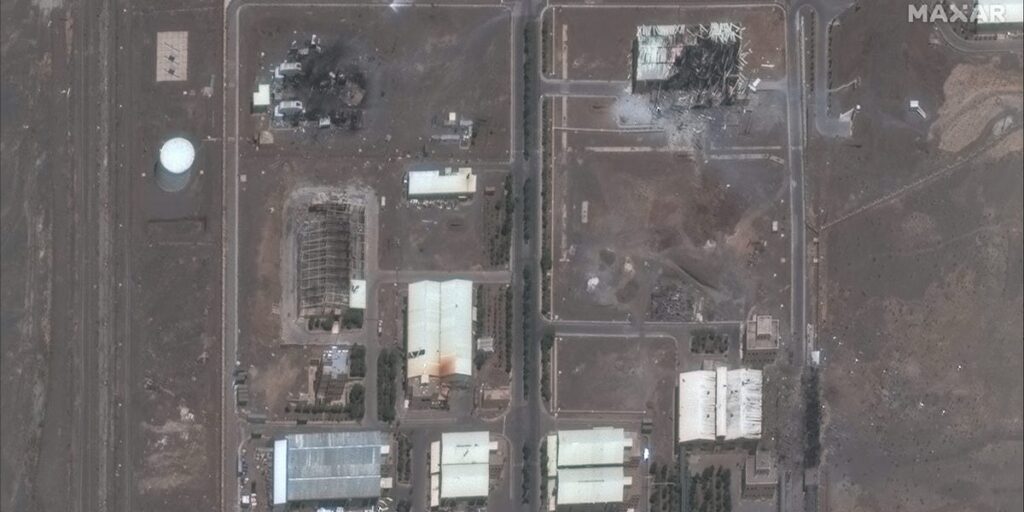Newly captured satellite images reveal extensive damage at one of Iran’s most important nuclear facilities after Israeli fighter jets launched significant airstrikes against the site on Friday.
The photos, taken on Saturday by US commercial satellite imaging company Maxar Technologies and obtained by Business Insider, show multiple destroyed buildings at Natanz, Iran’s main uranium enrichment facility, about 140 miles south of Tehran.
The images show damage only at the surface level; part of the facility is located several floors underground and can likely only be targeted by heavy bunker-buster bombs that Israel lacks.
Rafael Grossi, the United Nations nuclear watchdog chief, said Friday that some above-ground uranium enrichment facilities and electrical infrastructure at Natanz were destroyed.
He said there’s no indication of a physical attack on the underground facilities, but the space could be affected by a loss of power. The strikes also caused radiological and chemical contamination inside facilities at Natanz, though no leaks have been detected externally, he said.
Israel confirmed that it carried out strikes on other Iranian nuclear facilities, including Isfahan, which is home to three Chinese research reactors. Grossi said he was also informed of an attack at Fordow, Iran’s other main enrichment site, around 60 miles southwest of Tehran.
Satellite imagery did not appear to reveal any damage to the main buildings above ground at Fordow.
Nuclear experts say Fordow’s facilities, buried in the side of a mountain, run even deeper underground than Natanz. Because the country’s most critical facilities are in underground bunkers, it is difficult for Israel to completely wipe out Tehran’s nuclear program using only airstrikes.
The most capable weapon to reach Iran’s most buried and hardened sites is the US military’s GBU-57 Massive Ordnance Penetrator, one of the most powerful non-nuclear bombs. This 15-ton munition can only be carried by America’s B-2 Spirit stealth bomber and the B-21 Raider in development.
US officials said Washington was not involved in Israel’s offensive strikes; however, an official told BI that American forces in the region played a role in shooting down missiles that Iran fired at Israel in retaliation.
Israeli officials said the strikes on Friday aimed to degrade Iran’s nuclear program in order to prevent the country from making a weapon. Tehran has said that its nuclear ambitions are civilian.
Hundreds of Israeli aircraft were involved in multiple waves of strikes targeting Iran’s nuclear facilities, as well as its top scientists, ballistic missile program, senior military commanders, air defenses, bases, and other high-profile weaponry.
Iran has retaliated by launching volleys of missiles and drones at Israel.
The Israeli attack, dubbed “Operation Rising Lion,” raises the risk of plunging the region into more violence and could derail the Trump administration’s efforts to reach a new nuclear deal with Iran. But Netanyahu had long pushed for a military approach to Tehran’s nuclear program to prevent it from building nuclear weapons.
Read the full article here


